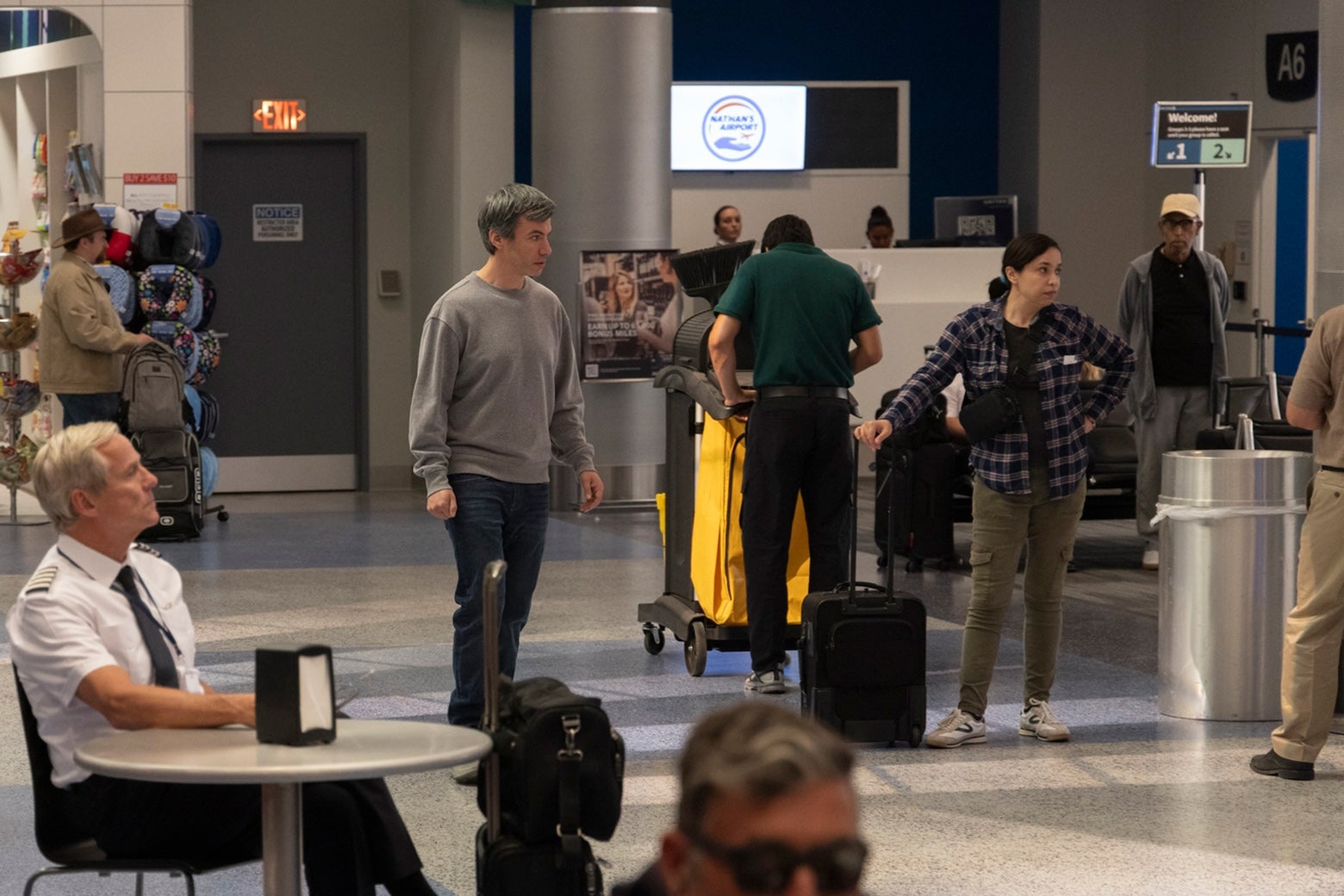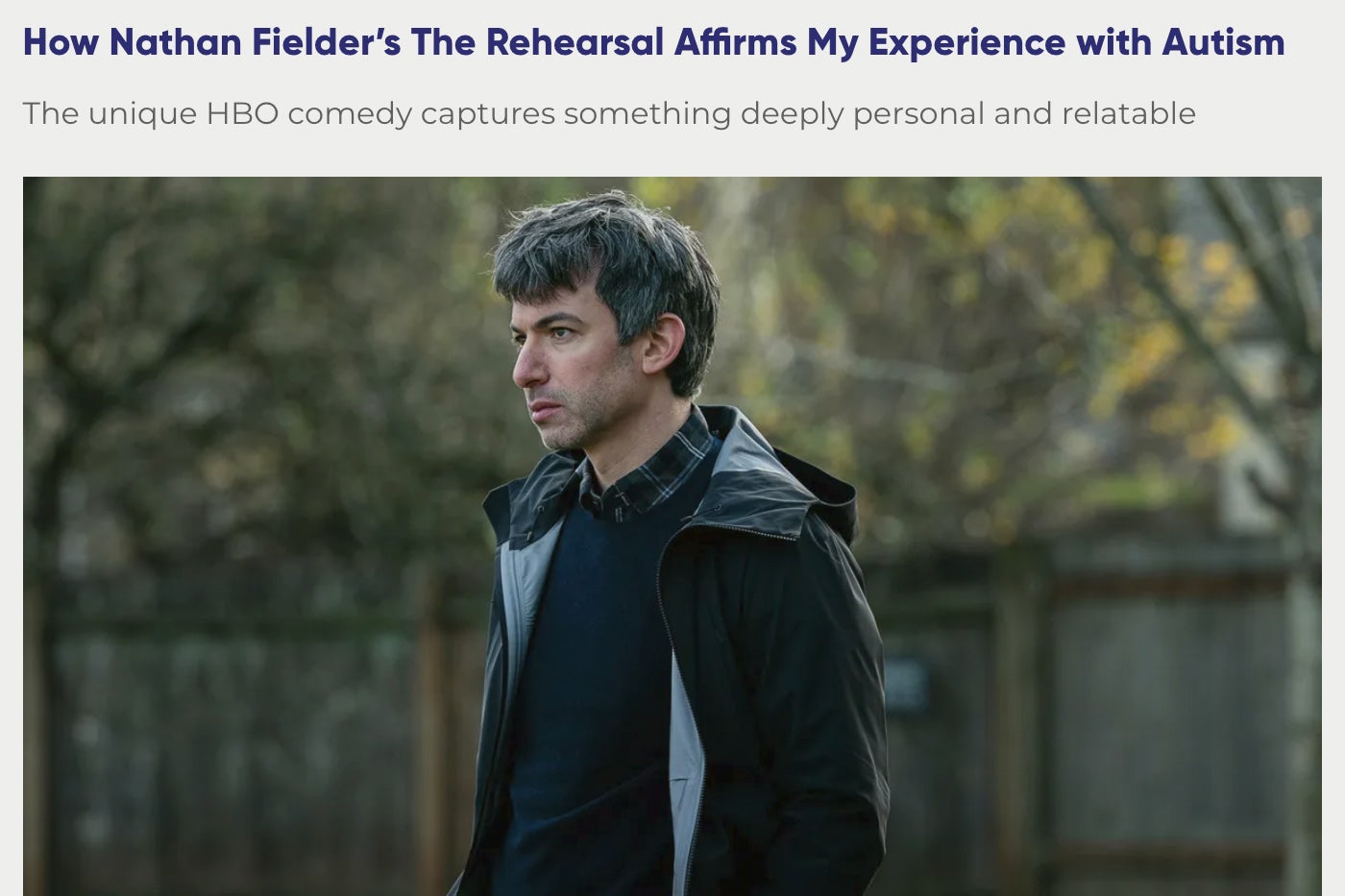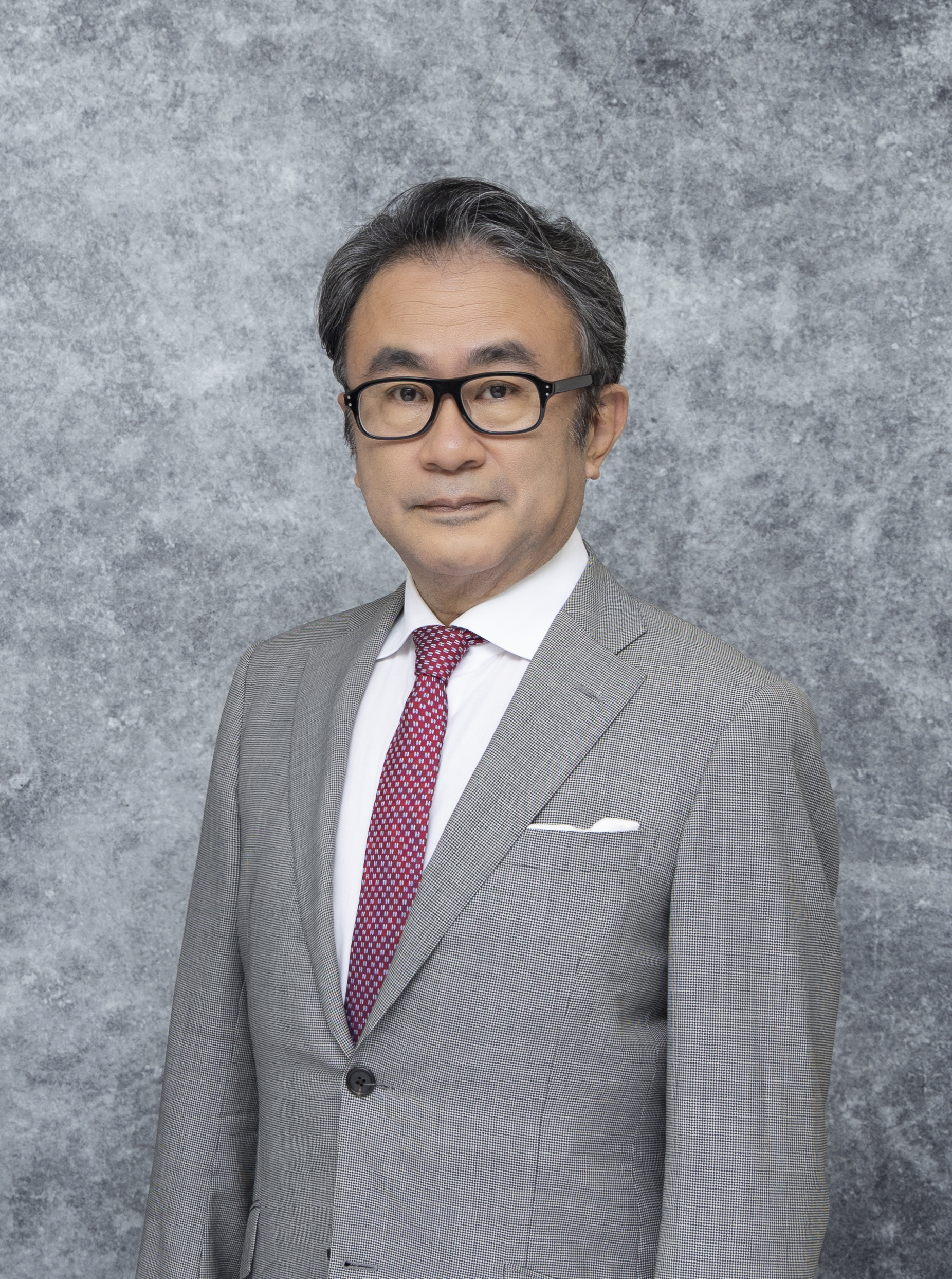
Somehow, Season 2 of HBO’s The Rehearsal is even zanier than the first one. This time, the life-size practice sessions that Nathan Fielder stages for everyday people to prepare for major life events (confronting a partner, raising a kid, making a TV series about social experiments) scale far beyond Hollywood studio lots and New York bars, delving into the all-too-timely issue of air safety and the uncomfortable interpersonal dynamics that go into co-piloting a successful flight. And in Episode 5, which aired on Sunday, Fielder even dives into his own psyche, exhibiting a probing self-examination on camera that’s unlike any of the other introspective moments we’ve seen so far from the ambitious comedian.
The episode, “Washington,” concerns Fielder’s ongoing attempt to persuade Congress that pilots’ social relations play a major role in whether a flight is likely to crash or not. He asks the lobbying team for HBO parent company Warner Bros. Discovery to get him a personal meeting with Louisiana Rep. Garret Graves, a now-retired Republican who paid special attention to the air industry during his time in the House. The lobbyists then inform Fielder that Graves’ office turned him down, writing in an email that “they didn’t think it was the right fit for them.” This sends Fielder into a Googling spiral, wondering whether his online image makes him come off as “nothing but a man acting like a complete fool.” While seeking out something—anything—on the internet that might indicate that he can be a serious person, he lands on a Consequence editorial from 2022 titled “How Nathan Fielder’s The Rehearsal Affirms My Experience with Autism.” Fielder intones in the narration that “it was an odd perspective, since my show had nothing to do with autism, but as I kept Googling, I realized it was everywhere,” as the camera zooms in on multiple examples of autistic writers and Redditors expounding at length on how The Rehearsal reflected their personal experiences and thought processes, “even though that was never my intent.” Fielder then spends the rest of the episode researching whether he’s inadvertently become an autism expert, and whether he can get taken seriously in Congress as an advocate for Americans with autism.
The author of the original Consequence essay, Sam Rosenberg, focuses his analysis on how The Rehearsal’s setup evokes the experience of masking, which he defines as “a survival mechanism in which autistic individuals suppress their neurodivergent traits in order to adapt to their surroundings.” This, he points out, “is essentially what each person in The Rehearsal is asked to do: act out social scripts and embody certain roles over and over again, to create a better sense of predictability and eliminate as much collateral damage as possible.” In other words, such rehearsals and performances for everyday social situations tend to be another part of everyday life, sans the props and high-budget sets that Fielder deploys.
Incidentally, I happen to personally know Rosenberg, a Los Angeles–based writer who works in film and TV. I was curious to hear his thoughts on his article being spotlighted in the show, what The Rehearsal says both implicitly and explicitly about autism, and whether Fielder tackles this subject with the care it deserves, at a time when our nation’s top public health officials continue to belittle autistic Americans. Our conversation has been edited and condensed for clarity.

My initial reaction was just excitement. I thought it was very funny that he called it an “odd perspective,” said he felt like that’s not what the show was about, and then saw all these other articles, and that just further persuaded him to take this issue of autistic masking very seriously. Addressing it evenly, not treating it facetiously or mockingly, and having genuine curiosity about it—seeing that from him was really validating.
After rewatching the episode, it’s also funny to see him try to connect autistic masking with the main issue of the plot of the season, which is dealing with the problem of emotional compartmentalization among airline pilots. Nathan creating these simulations to help first officers advocate for themselves felt very true to my experience of trying to unmask. I felt like the theme of the first season was him trying to mask so that he can better predict the outcome of certain situations that are socially and emotionally challenging. But in this season, he’s doing the opposite—he’s kind of teaching everyone, and I guess himself, to unmask so that they can prevent plane crashes from continuing. Even if the theory seems bonkers, I still feel like there’s a deep truth to it, which is that if you try to bury your true self or mask your true self because of your own emotional hang-ups, or for the sake of your job security, you will die. That’s the thesis, I think, that he’s trying to espouse.
I think it’s a good effort on his part to at least try to make this connection. He says something at the beginning of the episode when he’s doing his rehearsal in front of fake Congress: “I think we all struggle with things from time to time where it’s hard for us to be the people we ideally want to be in every situation, and the social pressures are on everyone, including pilots.” That is my understanding of masking: People want to be their ideal selves, but there are so many pressures to act a certain way in order to secure your job, to live your life, and that can have negative consequences.
I definitely had that concern, especially when he met with that doctor at the Center for Autism and Related Disorders. I mean, it was nice to have her validate this theory of this show being a metaphor for autistic masking, how difficult it is for autistic people to navigate certain situations, and that not every autistic person has severe issues, which is a widely misunderstood assumption. Then for her to give him that test where he has to identify the emotions of people based on people’s eyes and he gets both answers wrong—I thought that was funny because I was having trouble guessing, too.
I think it totally hints at the possibility that he could be on the spectrum himself, and I feel like there are so many instances throughout both seasons, but especially this one, that point there. There are the obvious clues of him having a monotone voice, having a lack of emotive facial expressions, struggling with social cues—like when he doesn’t know what “nose goes” is in the first episode—or having trouble understanding or wrapping his head around the flirty glance or gesture that woman does in Episode 4.
Then you think about hyperfixations and special interests, and he clearly has a hyperfixation on aviation safety, going so far as to do tons of research and detect these small patterns no one else can see, which also is a prominent but sort of underdiscussed autistic trait. When he did bring up his worry about using autistic children to help his case with the congressman, I was also worried—not just because of the flak he received last season when he was trying to parent a child—so I’m glad that he recognized the potential implications of exploitation in that regard. I also think he understands how difficult it is to make people take him seriously, as is highlighted in the beginning of this episode when he does that rehearsal in front of a fake Congress, and he’s trying to use a strategy of telling a joke to ease the tension and make his ideas more accessible but it doesn’t pan out.
What is making me feel conflicted is that I did some research on the center that he goes to, and this center specializes in ABA therapy, which is very controversially practiced on autistic kids. I went through ABA therapy growing up—and I don’t think the experience I had was as harmful as it’s been described online and within autistic communities—but I definitely felt like the purpose of said therapy was to eliminate problematic behaviors and condition me to mask my autism, as opposed to finding ways to use it to my advantage or to have some kind of identity around it. Then I actually looked up the doctor Nathan speaks to, Doreen Granpeesheh, and found she was in a pseudoscientific propaganda film, Vaxxed, that pushes the widely debunked theory that vaccines cause autism. I understand there are probably other contributing factors as to why Nathan decided to go with her—maybe they were just limited on time or budget—but it would have been nice if he did find an autistic or an autism-expert psychologist who doesn’t believe in that stuff.
My first thought is just to talk to actual autistic people. We are the best advocates for our own experience, and it’s not like there aren’t autistic people who work in the fields of psychology. There are tons of people. Usually, people who think that vaccines and autism are linked are not, I assume, on the spectrum themselves. And that just furthers the stigma.
I feel like this is something that’s missing in a lot of media. I’m thinking about Love on the Spectrum on Netflix, which is a show I kind of fucking hate.
It’s funny to me that that pilot going on those simulated dates in “Kissme,” the fourth episode from this season of The Rehearsal, is somehow better at capturing the awkwardness of dating as an autistic person than Love on the Spectrum, which people online already seem to have noted. Like a lot of autistic people, the pilot has a hard time knowing when to make a move because he can’t read the social cues and is therefore afraid of being too forward. I was charmed by Nathan’s attempt to build the pilot’s confidence through this “pack” experiment and make it easier for him to be himself, even if it’s under the guise of performance.
Regarding Love on the Spectrum, I appreciate the attempt at showing autistic people wanting to find love, wanting relationships. I think the actual presentation and execution of said idea is really infantilizing. It feels like National Geographic for autism, like, Look at these two autistic people in the wild, look at how awkward they are with each other. Then they play that dopey-ass music like Aw, they’re babies, they can’t take care of themselves, look at them be blunt with each other.
It feels very much from a gaze of someone who is not autistic. I just wish that we had more sensitive, lived-in, authentic depictions of autism in film, television, any kind of media space, that are actually created by and written from autistic individuals. Otherwise, there’s going to be a continual perpetuation of misunderstandings around autism and how autistic people live and navigate the world.
And perpetuating those misunderstandings when we have health regulators who think vaccines cause autism and have suggested creating a national registry. I’m curious, what would you want audiences to take away from The Rehearsal and its examination of autism in this time when we’re seeing all this dark shit from the people in power?
I hope that this sparks a very necessary conversation about autistic masking and how so many people struggle with this. Obviously, we all mask in some ways, whether we’re autistic or not, but autistic people in particular, such as myself, have had such a hard time trying to be our true selves. I feel like all we’ve been taught is to just conform to social and cultural expectations, and it’s very debilitating both emotionally and psychologically. I hope that people see and understand that. Maybe they can think about how to live more authentically in their own lives and not to be afraid to be themselves. I’m in a space right now where I’ve been the most unmasked I’ve ever been, and it’s been great.
But I do feel like there are certain instances and certain situations where I am kind of required to mask, or at least to hide my discomfort in a way so that I can get through whatever situation. It can be something of a necessary evil, and it’s never going to go away. It’s always going to be a part of me. The only thing I can do is just learn how to manage it on my own terms and figure out my own needs and meet them.
I think that’s another thing, too, is a lot of people don’t want to know themselves. In The Rehearsal, Nathan is so good at getting people to challenge themselves, to be themselves, to be honest and be truthful, even though it’s under the guise of this artificial setup where they can practice and prepare for real-life situations. People spend their whole lives not knowing themselves, and that has pretty drastic consequences on that person and on everyone around them.
It’s interesting to consider all this while thinking back to Nathan for You. In hindsight, are there moments from that show that also represented these dynamics of masking, of not feeling like yourself in the world?
There’s that one clip I love where he tries to do a job interview and has an earpiece with a 7-year-old telling him how to talk to the interviewer. The job interviewer’s reactions are priceless, and Nathan’s false confidence is so funny to watch. I think he was still poking into some deep truths about the absurdity of reality and how things like job interviews can be so difficult, because you’re trying to present a version of yourself in order to get the job, but it might not necessarily be the most authentic version of yourself. In that way, it’s sort of a form of masking. Job interviews are terrifying to me. I overprepare. I rehearse constantly. So I totally identify with Nathan’s neurosis about this stuff, and Nathan for You absolutely connects, partially at least, to what The Rehearsal is exploring. And The Curse, too.
The Curse was great.
I was so into it. It was also very funny, but it was also fascinating to see how much shit he gets away with. The stuff he pulls off in both The Curse and this season of The Rehearsal is unbelievable. I think, in the context of masking on The Curse, Nathan’s and Emma Stone’s characters are trying to paint themselves in a certain way in order to be successful. But they have an agenda, whether they’re conscious of it or not, to make a business for themselves, and that involves some form of exploitation. His background of working in reality TV, I think, allows him to deal with some of the uncomfortable truths that he confronted while he was working in that position, and he’s expressing it through these very funny and accessible, but also unnerving, situations and scenes and ideas. There’s something really interesting about what Nathan is trying to say in terms of the consequences of avoiding being our true selves for the sake of social conformity, for the sake of financial stability, for the sake of maintaining a relationship with someone, and the way he deconstructs that is really resonant, at least, with me.
I’m right there with you on admiring the wild things Nathan’s able to get away with in all his shows. When I was growing up, I definitely tried to make sure I wasn’t stepping out of bounds by observing what other people were doing, trying to fit into and replicate that, being careful in general. So I always had an admiration for people who were so out there—performers, artists, creatives who came off very confidently and said shit on their mind. I don’t think it’s a coincidence that I was a fan of Nathan for You and, like, Odd Future in high school. I wonder if that ever rang true to you as well.
Absolutely. I liken Nathan to a lawful-good Andy Kaufman. There’s something about his ability to blur fiction with reality so well and almost so seamlessly that you can’t tell the difference.
But Nathan does it in a comedic way that I think he is earnest about. On The Rehearsal, he’s talking about how it’s easier for people to be their true selves if they’re doing it through an active performance. The same thing could be said about him, that maybe he can only really be his true self if he’s performing in some way. Even though all of this could be real, there is a heightened sense of reality to what he’s doing, because he’s in control of everything. He writes. He directs. He created the whole thing. He’s performing in it. Basically, we’re watching his brain. I’m fascinated by that, and I’m fascinated by someone who doesn’t censor themselves in a way that’s still productive.
Odd Future was also a thing for me in middle and high school. Bo Burnham really resonated with me when I was around that age too, because he is this gangly, awkward, anxious white guy who also is very smart and witty, able to have these really deep, rich insights and observations about life that he can make funny and accessible. It’s nice when you have someone who has similar neuroses as you, who might have similar tendencies or personality tics as you, but is able to articulate themselves in a way that maybe you struggle to because of your masking or your own inability.
I’m a writer and a filmmaker, and I like to be behind the scenes. I don’t like to be on stage or in front of a camera. It’s terrifying to me, because I’m constantly aware of the fact that I’m acting and performing in front of a group of people. That relates to my autism, too, because with performing, there are a lot of sensory inputs and overloads that can be overwhelming for me. I’m constantly hyperaware of it all, I’m processing so much sensory information around me that it’s hard to concentrate on what I’m doing. So it’s nice when there’s someone like Bo Burnham or like Nathan Fielder who is able to do what I can’t and speak on things, on issues, on limitations, social limitations in a way that can be really powerful.
Get the best of movies, TV, books, music, and more.











